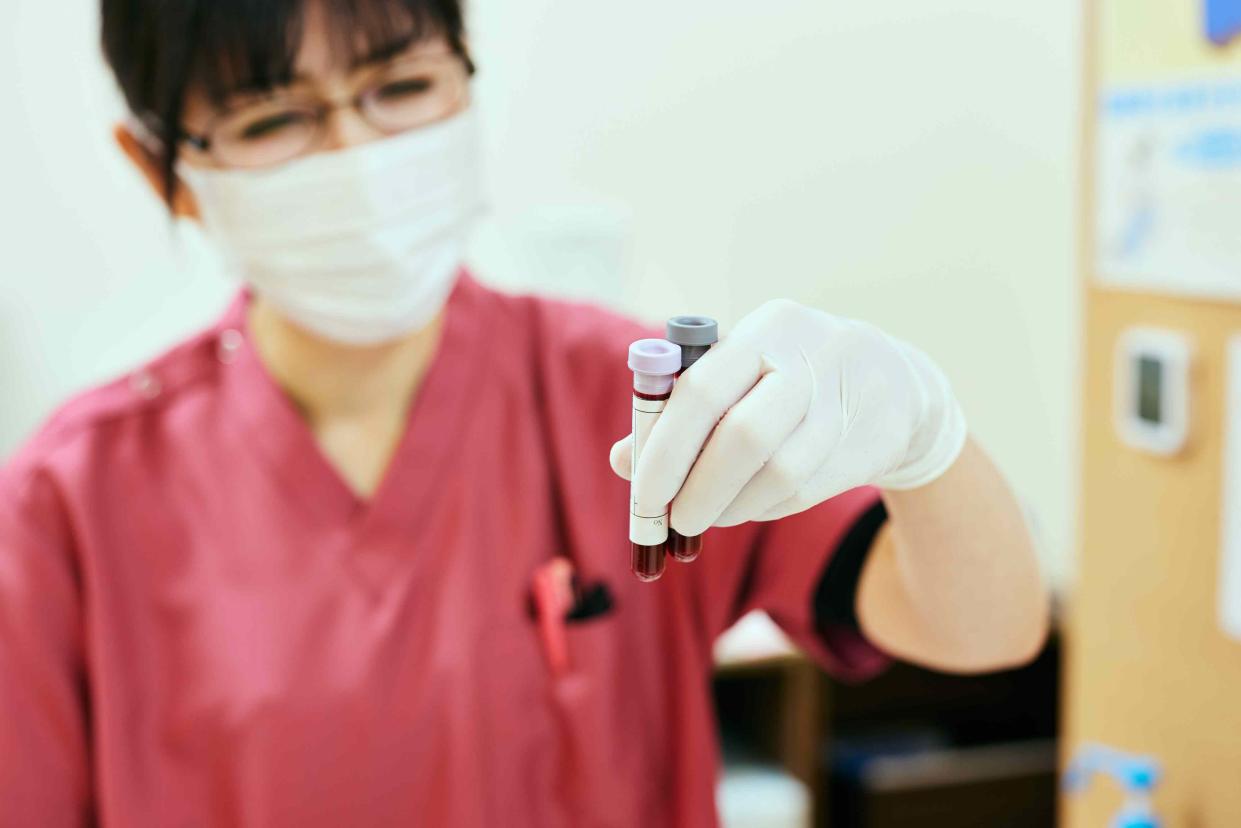Can You Measure Anxiety With a Blood Test?

Yoshiyoshi Hirokawa / Getty Images
Researchers at Indiana University developed a new blood test that can measure anxiety level and risk.
If proven effective, the test might be able to help providers better match treatment options to individual patients.
Experts say current anxiety treatments don’t always work well or are addictive.
What if a simple blood test could quantify your anxiety and match you to the right treatment? That’s what researchers out of Indiana University are proposing with the launch of a new blood test for anxiety.
The test is not designed to diagnose anxiety, but it can help measure someone’s anxiety levels and even determine future risk for developing anxiety.
Alexander Niculescu, MD, PhD, a professor of psychiatry at Indiana University School of Medicine who helped develop the anxiety blood test, said the test is like a glucose test for diabetes because both tests give healthcare providers objective information to help make clinical assessments.
The anxiety blood test is not yet covered by insurance, but the researchers hope that it will eventually be included as part of the annual physical exam.
“That’s the place where I think this would make a big impact,” Niculescu said. “It removes some of the stigma. It’s just another biological abnormality that can be identified, treated, monitored, and prevented.”
In the report published in the journal Molecular Psychiatry, Niculescu and his team identified 19 biomarkers that could track and predict anxiety. All of the biomarkers have medications associated with them, Niculescu said, so that treatments can be assigned based on which biomarkers are identified.
The researchers used these biomarkers to determine if any currently available medications could be repurposed to treat anxiety so patients wouldn't have to wait for a new drug to be developed.
Zachary A. Cordner, MD, PhD, an assistant professor of psychiatry and behavioral sciences at Johns Hopkins Medicine who’s not affiliated with the study, said the findings are “very compelling,” but the technology needs to be further tested.
“I do think that it will be important to see whether this technology produces similar results in different clinical settings. And that is just yet to be determined,” Cordner told Verywell.
Will This Blood Test Change How Anxiety Is Diagnosed?
Providers currently evaluate patients based on the criteria in the Diagnostic and Statistical Manual of Mental Disorders (DSM-5-TR). They may ask questions about the frequency of anxiety-related symptoms, such as trouble concentrating, restlessness, and muscle tension.
“The way that we do things now is actually fairly effective,” Cordner said.
But research has found that among the DSM Task Force members who oversaw the creation of the previous edition (DSM-5), nearly 70% had financial ties with pharmaceutical companies. This was also true of 51% of the members of the work group that updated the section on anxiety disorders.
The new blood test, which was designed in part to provide an additional measure for anxiety, could be useful in monitoring high-risk patients, Cordner added.
Niculescu said the blood test could be an additional tool in preventative mental health care. Even if the blood test shows that someone doesn’t currently have anxiety, providers can keep an eye on the results year after year and offer preventative treatments for anxiety if they notice changes.
“These are not DNA where you test once and you’re one and done. These are RNA that fluctuates with disease severity, with treatment response, and with different stages of your disease,” Niculescu said.
Related:How Anxiety Disorder Is Diagnosed
Will Anxiety Blood Tests Become Part of a Care Routine Soon?
Current anxiety treatments are sometimes based on trial and error and they don’t always work well or are addictive, according to Niculescu. He said the blood test would help mental healthcare providers better determine treatment for the patient based on specific anxiety biomarkers identified in the test.
However, some mental health experts say it is too early for these blood tests to be used to guide anxiety screening and treatment plans.
Paul S. Appelbaum, MD, a professor of psychiatry, medicine, and law at Columbia University, told Verywell that more studies are needed to confirm that using the blood test really allows for more effective treatments than what a mental healthcare professional can currently prescribe without the blood test.
“Whenever you see a finding like this, which is interesting, but clearly preliminary, what you want is to see it confirmed, not just by the original researchers, but by other groups as well,” Appelbaum said.
It’s too soon to know how much a test like this would cost if it were covered by insurance, but Niculescu said the current self-pay test available online would be cost-prohibitive for many people.
These anxiety blood tests are not yet commercially available. If you're experiencing anxiety, consider speaking with a mental health professional about screening options.

